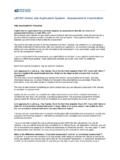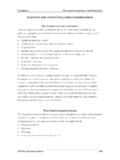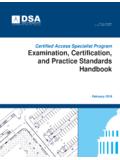Transcription of Cross-Examination of the Computer Forensics Expert
1 Cross-Examination of the Computer Forensics Expert Your Witness (C) Charles Bragg Craig Ball Cross-Examination of the Computer forensic Expert text 2004 Craig Ball 2 Cross-Examination of the Computer forensic Expert Today, some 95% of all documents are created using computers. Daily electronic mail traffic far outstrips postal mail and telephone usage combined. Computer technology impacts every facet of modern life, and the crimes, torts and disputes which carry us to the courthouse are no exception. The new field of Computer Forensics entails the identification, preservation, extraction, interpretation and presentation of Computer -related evidence. Far more information is retained by a Computer than most people realize, and without using the right tools and techniques to preserve, examine and extract data, you run the risk of losing something important, rendering what you find inadmissible, or even causing spoliation of evidence.
2 Though I ve been immersed in Computer Forensics as a trial lawyer and as a Computer Forensics student, examiner, author and instructor for some time, I d never come across an article that offered practical advice on the Cross-Examination of a Computer Forensics Expert . The goal of this paper is to improve the caliber and candor of those who testify as Computer Forensics experts and to help lawyers get to the truth, not obscure it. The Cops-and-Robbers Mindset The world of Computer Forensics is heavily populated by former law enforcement officers from the Secret Service, FBI, Treasury, military investigative offices and local police forces. Many of these veteran officers--though generally well-trained and capable--have a good guy/bad guy mentality and regard Computer Forensics as a secret society where they don't want the "bad guys" to know their secrets.
3 Lawyers are seen as aiding the bad guys, and the very last thing forensic examiners want is for lawyers to understand the process well enough to conduct an effective cross examination . With some justification, former cops view lawyers with suspicion and even disdain (how this makes them different from the rest of the world, I don't know). To their way of thinking, lawyers are contemptuous of the truth and bent on sowing the seeds of distraction, confusion and doubt. This mindset can make forensic examiners guarded witnesses: not necessarily hostile, but reluctant, or quick to dive under cover of technical arcana and jargon to shake off a pursuer. A forensic examiner is dealing with largely objective observations and shouldn t come across as an advocate.
4 If evasive or uncooperative on cross , give the witness enough rope for the jury to see it. Tool Tykes Poorly-trained experts rely on software tools without much understanding how they work. They re Tool Tykes. Of course, all of us trust and swear by tools we don't fully understand--do you really fathom how a quartz wristwatch tells time or a mouse moves the cursor? but, an Expert should be able to explain how a tool performs its magic, not offer it up as a black box oracle. Tool Tykes are trained to dodge attacks on their lack of fundamental skills by responding that, The tool is not on trial or citing how frequently the testimony of other witnesses using the same tool has been accepted as evidence in other courts. Don't let them get away with this evasion.
5 A great tool in unskilled hands Cross-Examination of the Computer forensic Expert text 2004 Craig Ball 3 is not reliable. Press the witness to either explain how the tool achieves its results or admit they don't know. Be advised that this technique will flush out only the pretenders to the throne of " Expert ." Real pros are going to know how their tools work down at the bit level and be able to explain it in a way any juror can grasp. Of course, you should be ready to distinguish the right explanation from technical doubletalk. Computer Forensics is a new discipline and many Computer savvy persons without forensic training or experience offer their services as experts. Just as not every doctor is qualified as a coroner, not every systems administrator is a Forensics Expert .
6 A background in law, law enforcement or investigation is important, whereas programming skills have little bearing on Computer forensic skills. Be certain to obtain the witness and check it for accuracy. Look for membership in professional associations of Computer forensic examiners, formal training and certification. Find out if the witness has published articles on Computer Forensics or participated in list serves supporting the discipline, then find and read those contributions. Chain-of-Custody Issues Because of their law enforcement backgrounds, forensic experts tend to be very savvy about the importance of, and the proper procedures to maintain, a chain of custody. A chain of custody attack is warranted when you can level a credible charge that someone tampered with the evidence.
7 The critical importance of the chain of custody is drilled into every Computer forensic Expert . If you can prove the witness botched the chain of custody, the witness will be shaken and defensive. Even when tampering isn t suspected, a sloppy chain of custody suggests a poorly qualified Expert . The Limits of Computer Forensics Nearly everyone uses computers, but few users understand them well. A witness who s mastered the Computer s deepest secrets may enjoy a Guru-like authority when testifying. If you're seeking to cast doubt on the witness or the "science" of Computer Forensics , you may gain traction by getting the witness to concede some of the things an examiner can t ascertain about how a particular Computer was used or who used it.
8 Though Computer Forensics specialists can perform miraculous tasks, there are limits to what we can divine or resurrect. Some of these limits are oddly mundane. For example, it can be difficult to establish that a user altered the time on their Computer , especially if the clock has been correctly reset by before the examiner arrives. Computers are pretty "stupid" where time is concerned. A toddler (at least one who doesn't live in Alaska) would challenge the assertion that it's midnight if the sun's still up, but, no matter what the actual time may be, a Computer accepts any setting you give it as gospel. There are ways to ferret out time manipulation, but they aren t foolproof. Similarly, a Computer can t identify its user.
9 At best, it can reveal that the user was someone with physical access to the machine or who perhaps knew a password, but it can t put a particular person at the keyboard. Usage analysis may provide other identity clues, but that, too, isn t foolproof. Establish the limits to what an examiner can say with Cross-Examination of the Computer forensic Expert text 2004 Craig Ball 4 certainty, and afford the examiner an opportunity to concede those limits or overreach them. Missing in Action When hard drives were smaller, it was possible to thoroughly examine them by looking through the data. It was a tedious process, to be sure, and one where it was easy to grow tired and overlook something. Still, it was a pretty reliable process.
10 Hard drives have grown to gargantuan volumes, , the 60 gigabyte hard drive in my current laptop is 3,000 times larger than the 20 megabyte drive in my first portable Computer . It's all but impossible in the usual engagement for an examiner to look at all the data on the drive. It's overwhelming to thoroughly examine just the places where data most often hides. Consequently, examiners must rely upon software tools to get the job done. Keyword searches are an integral part of Computer forensic examinations and entail an examiner entering key words, phrases or word fragments into a program which then scours the drive data to find them. False positives or negatives are less of a problem than the literal way computers approach searches.
![Musings on Meet and Confer[1] - Craig Ball](/cache/preview/1/d/f/4/3/6/b/f/thumb-1df436bf3ad0de7eda6169531df27533.jpg)








